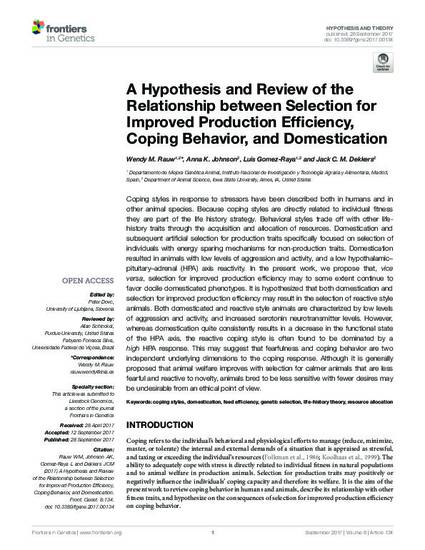
Coping styles in response to stressors have been described both in humans and in other animal species. Because coping styles are directly related to individual fitness they are part of the life history strategy. Behavioral styles trade off with other life-history traits through the acquisition and allocation of resources. Domestication and subsequent artificial selection for production traits specifically focused on selection of individuals with energy sparing mechanisms for non-production traits. Domestication resulted in animals with low levels of aggression and activity, and a low hypothalamic–pituitary–adrenal (HPA) axis reactivity. In the present work, we propose that, vice versa, selection for improved production efficiency may to some extent continue to favor docile domesticated phenotypes. It is hypothesized that both domestication and selection for improved production efficiency may result in the selection of reactive style animals. Both domesticated and reactive style animals are characterized by low levels of aggression and activity, and increased serotonin neurotransmitter levels. However, whereas domestication quite consistently results in a decrease in the functional state of the HPA axis, the reactive coping style is often found to be dominated by a high HPA response. This may suggest that fearfulness and coping behavior are two independent underlying dimensions to the coping response. Although it is generally proposed that animal welfare improves with selection for calmer animals that are less fearful and reactive to novelty, animals bred to be less sensitive with fewer desires may be undesirable from an ethical point of view.
Available at: http://works.bepress.com/anna_butters-johnson/289/

This article is published as Rauw, Wendy M., Anna K. Johnson, Luis Gomez-Raya, and Jack Dekkers. "A Hypothesis and Review of the Relationship between Selection for Improved Production Efficiency, Coping Behavior, and Domestication." Frontiers in genetics 8 (2017): 134. doi: 10.3389/fgene.2017.00134. Posted with permission.